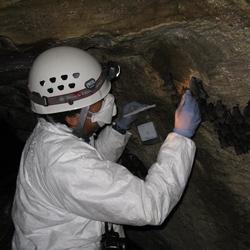Julien Martin, Ph.D.
Julien Martin is a Supervisory Biologist based at the Eastern Ecological Science Center.
Julien Martin is a Supervisory Biologist at the US Geological Survey's Eastern Ecological Science Center. He is the capability team manager of the Quantitative Methods and Decision Science team. He obtained a Ph.D. in the department of Wildlife Ecology and Conservation at the University of Florida. He is a courtesy faculty in the Department of Wildlife Ecology and Conservation at the University of Florida. His expertise includes: ecological modeling, population dynamics and the application of decision theory to natural resource management.
Professional Experience
01/2022-Present: Supervisory Biologist at the US Geological Survey (USGS) at the Eastern Ecological Science Center. Laurel, MD.
09/2014-01/2022: Research Wildlife Biologist at the US Geological Survey (USGS) Wetland Aquatic Research Center. Gainesville, FL.
07/2009-09/2014: Research Scientist at the Fish and Wildlife Research Institute/Florida Fish and Wildlife Conservation Commission (FWC), St. Petersburg, FL.
10/2019-present: Courtesy Associate Professor in the Department of Wildlife Ecology and Conservation, University of Florida, Gainesville.
01/2010-10/2019: Courtesy Assistant Professor in the Department of Wildlife Ecology and Conservation, University of Florida, Gainesville.
07/2007-06/2009: Postdoctoral Research Associate at Patuxent Wildlife Research Center (USGS, Laurel, MD).
09/2001-05/2007: Graduate Research Assistant at the Florida Cooperative Fish and Wildlife Research Unit, USGS/Department of Wildlife Ecology and Conservation at the University of Florida, Gainesville, FL, 40 hours/week. Supervisor:
09/2000-09/2001: Graduate Research Assistant at the Centre d’Etudes Biologique de Chize (CEBC), Centre National pour la Recherche Scientifique (CNRS) and French Polar Institute (IPEV), Chize, France.
10/1998-03/2000: Wildlife Field Biologist and environmental advisor in French Subantarctic islands, Centre National pour la Recherche Scientifique (CNRS) and French Polar Institute (IPEV), Kerguelen and Crozet islands, French Southern and Antarctic Lands.
1998: Field biologist for the Irish Fisheries Board, Dublin, Ireland.
Education and Certifications
Ph.D., Wildlife Ecology and Conservation, University of Florida













